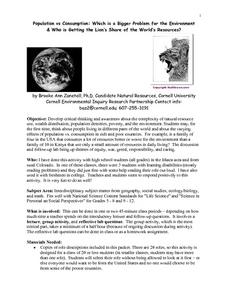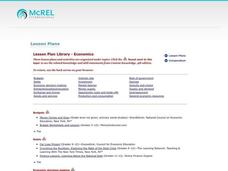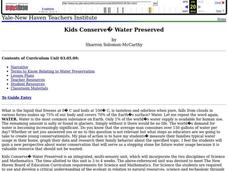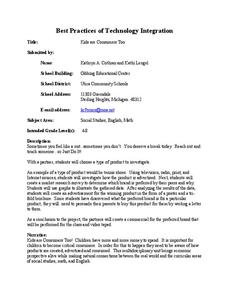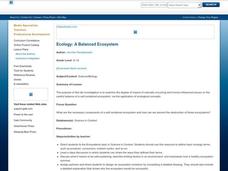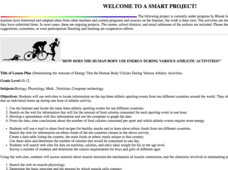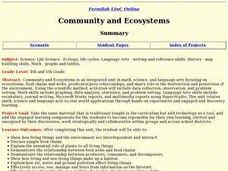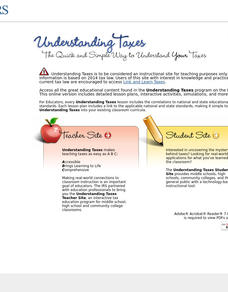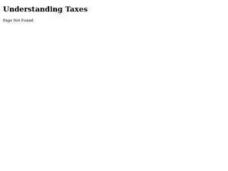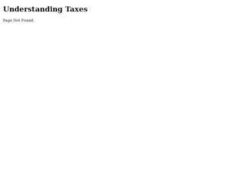Curated OER
Population Vs Consumption: Which is a Bigger Problem for the Environment & Who is Getting the Lion's Share of the World's Resources?
Students develop critical thinking and awareness about the complexity of natural resource use, wealth distribution, population densities, poverty, and the environment. They think about people living in different parts of the world and...
Curated OER
Imaginary Trip to South Korea
Students "visit" South Korea through the use of technology, in a fun, and stimulating, detailed project. They arrange travel, make choices, work through a budget, learn history, have exposure to language, and get a sense of what a...
Curated OER
Let the Phone Get Them Talking! Using the Yellow Pages as a Teaching Resource
Students categorize information in the Yellow Pages. In this Let the Phone Book Get Them Talking! lesson, students find pictures in the Yellow Pages and thus gain a better understanding of how the book is organized. Students locate local...
Curated OER
Potato: A Tale from the Great Depression
Learners barter for goods within the class. For this economics lesson based on the Great Depression, the teacher introduces the lesson with a picture book, then students are allowed to barter with teacher supplied goods as they examine...
Curated OER
Micro Economics - Personal Budgeting
Students explore the real world as it relates to money and how people use it. In this money management lesson, students jump into the real world as they role play with money through spending, saving, being married, single, having...
Curated OER
Creating a Commercial
Students investigate the world of advertising and video production by creating their own commercial. In this advertising lesson, students discuss a fictitious product which they create an advertising campaign for. Students create a...
Curated OER
Neighborhoods
Students examine homes around the world. In this multicultural lesson, students read the book A World of Homes and Homes Around the World. Students compare and contrast the homes in the books to their own homes. Students construct a...
Curated OER
Parallel DC Circuits
In this circuits learning exercise, students answer 24 questions about parallel DC circuits including finding the current drawn by resistors, the total resistance, and the voltage impressed across each resistor in the circuit. Students...
Curated OER
My Favorite Breakfast Foods
First graders consider the importance eating breakfast. In this breakfast foods lesson plan, 1st graders plan meals, examine a variety of breakfast options, and discuss the food groups. Students taste a variety of foods. Extension...
Curated OER
Best Breakfast Authors
Third graders write a story. In this breakfast authors lesson, 3rd graders write about a breakfast food and why it is a good selection. Students may illustrate stories and share with their peers.
Curated OER
Kids Conserve? Water Preserved
Students study conservation and how cities obtain their water. In this water instructional activity students view a PowerPoint presentation and draw a picture of the water cycle.
Curated OER
Best Practices of Technology Integration
Students study how a type of product is advertised. In this product advertisement lesson, students research a specific product and its advertisement. Students create a market research survey based on their peers preferences. Students...
Curated OER
Wetlands - Food Web Relationships
In this food web relationships worksheet, students click on the links to learn about the food web relationships in the wetlands and answer short answer questions about it. Students complete 8 questions total.
Curated OER
Food Web Relationships
In this food web learning exercise, students create a food web matrix and answer short answer questions about the food chain according to the matrix. Students complete 7 short answer questions.
Curated OER
Your Role as a Taxpayer: Why Pay Taxes?
Students evaluate the basic rationale, nature, and consequences fo taxes. They describe why governments need taxes as revenue to provide goods and servicesin this series of activities.
Curated OER
Ecology
Learners gain an understanding of necessary components required within a healthy, sustainable environment and ways human actions can impact that balance while discovering how to recognize and analyze explanations and models used in...
University of Rhode Island
How Does the Human Body Use Energy during Various Athletic Activities?
Students investigate how much energy is used during different athletic activities. They conduct Internet research to obtain information on the top three athletic sporting events from around the world, and calculate the calories burned...
Curated OER
Free Enterprise -- Product Cost
Students are introduced to the concept of free enterprise. In groups, they discuss the price of various food items and decide on which item to produce. They calculate the cost of producing the item and share their results with the class.
Curated OER
Community and Ecosystems
Students complete a unit of lessons on ecosystems. They participate in online activities, create a diorama, write journal entries, and develop a Hyperstudio multimedia project on a selected ecosystem.
Curated OER
Fairness in Taxes
Students identify and describe two criterion of tax fairness: benefits received and the ability to pay and distinguish between wealth and income as measures of ability to pay.
Curated OER
What is Taxed and Why
Students are exposed to the need for federal, state and local governments to tax constituents to provide goods and services for their residents. They identify the different kinds of taxes and give examples of the goods and services taxed.
Curated OER
The Taxpayer's Rights
Students examine rights of taxpayers and procedures the IRS uses to process tax returns
Curated OER
The Taxpayer's Responsibilities
Students explore system of voluntary compliance, and describe taxpayers' responsibilities related to filing a tax return.
Curated OER
The Wealth Tax of 1935 and the Victory Tax of 1942
Learners explain that during the Great Depression and World War II, the Roosevelt administration implemented new, broader, and more progressive taxes in order to cover the costs of the New Deal programs and the war.
Other popular searches
- Consumer Math Worksheets
- Consumer Math Projects
- Consumer Math High School
- Consumer Math Activities
- Consumer Math Lessons
- Percentage Consumer Math
- Consumer Math Food
- Consumer Math Simulations
- Consumer Math Using Catalogs
- Money Consumer Math
- Consumer Mathematics
- Consumer Math Projects 40s


